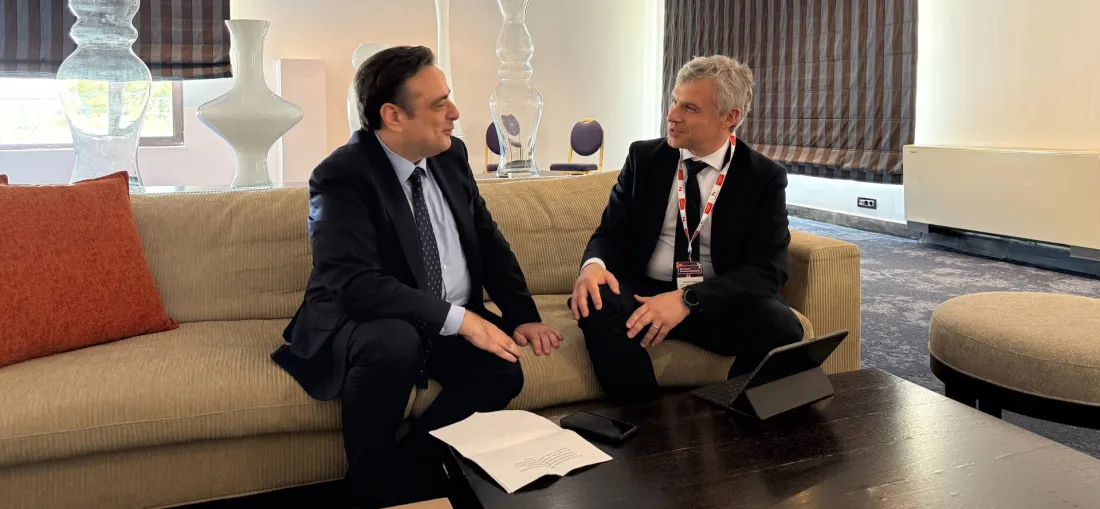Giovanni Callegari in interview with Radio Athens

Giovanni Callegari, Head of Economic Risk Analysis, Country Team Coordinator for Greece
Transcript of interview on Athens Radio
Conducted on 3 July, broadcast on 8 July 2025
Interviewer: John Papageorgiou
Original language: English
Athens Radio: To begin with, we would like to hear your overall assessment of the current state of the Greek economy and its outlook, with a particular focus on Greece’s fiscal position as well.
Giovanni Callegari: Let me start by congratulating the Greek people. Greece's economic progress in recent years has been nothing short of remarkable.
And it's not just a matter of growth performance - every year since 2021 Greece has not only exceeded expectations but also outpaced euro area growth.
It is also an issue of many different economic dimensions. Unemployment is at its lowest level since 2008, a major milestone. Average incomes have also risen significantly, and as you mentioned, fiscal deficits are basically gone. Last year, Greece was one out of six countries in the European Union that had a budget surplus, meaning that total revenues were higher than total expenditures including interest payments, which, if you think of the situation just ten years ago, is a major achievement. Let’s not forget that 10 years ago, the Greek people were voting on a referendum on the third bailout. After this massive improvement, the Greek people can and will expect more opportunities, higher living standards and well-paying jobs. And this is where the budgetary space generated by the very strong revenue over-performance can help. Greece should continue all its prudent policy course and investment spending, as this can help productivity growth. This can be achieved only through a more efficient economy, one that can raise wages and hence living standards in a way that does not create new economic imbalances. A more efficient economy allows higher remuneration.
One of the main concerns for the ESM has long been the issue of arrears. Is this still the case?
Greece had about €8 billion of arrears, which was a significant amount, spanning over different sectors, like pension arrears, commercial arrears to providers. These arrears were holding back the economic recovery, because it holds back money that could be invested and worsens the cash flow and the liquidity position of many firms. Arrears create serious uncertainty in the private sector. The effort of the different governments, both during the economic support programmes but also recently over the last years, has been geared towards reducing arrears, and the reduction has been impressive, like the success seen in other areas. The point is that this is the last mile, so it's difficult to make the last efforts to reduce them further. And this is particularly important in the healthcare sector, in which arrears are concentrated. We need to focus and continue the reform efforts to reduce them. For instance, a centralised procurement system, where spending is managed centrally, and the government has more leverage to obtain lower prices. This is an effort that can help to reduce these arrears further. So, bottom line, it's not the gigantic issue that was in the past, but still some efforts are needed.
In your view, what are the main challenges for Greece currently?
In the Greek economy, the main challenge right now is ensuring that the growth is spread across all sectors of the economy. We need to close the productivity gap with the other countries, so that the level of efficiency of the economy reaches that of other euro area countries or other advanced economies. And there are encouraging signs in terms of new technologies, new sectors growing, financed by foreign investment. But this is something that needs to continue. And the dynamism of the Greek economy is very important. The fact that there is this continuous and deep reform effort is extremely important because it reinforces credibility among investors. There is another big challenge, productive investments that help to share the benefits with everyone. This means promoting sectors besides real estate, which just raises prices and has not so beneficial effects on the rest of the population.
Do you see any ways or any areas in which the ESM could contribute to the growth of the Greek economy to enhance competitiveness based on today's global circumstances?
For sure, the relationship between Greece and the ESM is here to stay, and for a good reason. First, because we are the largest creditor. The EFSF and the ESM hold about €190 billion in Greek debt. There is a strong and ongoing cooperation between the ESM and the Greek government, because as the programme years fade into the background, we are evolving into a true partnership. We share insights, exchange views, and support Greece's economic resilience through the analysis of many economic developments and the analysis how the surrounding environment is changing over time. And as an institution we are learning a lot from Greece through this exchange. We have also an interest in HCAP [Hellenic Corporation of Assets and Participations], the entity that manages Greece's main public assets. We do not enter day-to-day management, of course, this is a sovereign issue of the Greek state, but we are interested in making sure these assets can leverage their value, amplify and increase their impact on the economy. So, the transformation of these assets and their management needs to be done in a way that can also help attract private investment.
The Recovery and Resilience Facility (RRF) is set to expire in 2026. What might this mean for the Greek economy? Could it affect its growth trajectory?
It can, but it should not. And the Greek government has the fiscal means, thanks to the revenue over-performance that I mentioned before. Greece has the fiscal capacity and potential to take over from the RRF. The RRF has been providing huge support for investment. We are talking about €30 billion in grants and loans, earmarked for investment in green energy, digital transformation, and infrastructure. And not only that, it is also about reforms in the judiciary, the labour market, public administration - all geared towards delivering long-term growth and closing the productivity gap, the efficiency gap that I mentioned before. So, it's important to use the fiscal resources that are available through the successful fight against tax evasion, to prolong and devise new investment projects and infrastructure in business and environment support. But it is also important that the government keeps this dynamism, this ability to continue reading the economic conditions and to identify what other reforms are needed to deal with any changes that might occur.
Finally, as we are referring to the EU funds, in a few days, we expect the European Commission's proposal for the next Multiannual Financial Framework (MFF). In your opinion, what key features should it include in order to be effective?
The MFF used to be a very arcane thing for very technical people. Now, it is part of the public discourse. It's good news because it means that the EU budget, the EU level fiscal decisions, are seen by European citizens, Greek citizens included, as important. This was maybe not the case in the earlier years of the EU. Let me take the perspective of the ESM, whose mandate is crisis management and crisis prevention. The next EU budget is particularly relevant in times in which the geopolitical volatility and uncertainty of the economic environment are high. We do not know how the geopolitical environment is going to be in two years, and that is why we need to be prepared. Let me stress one point that is very important. The MFF, the EU budget alone, is not enough. In the ESM, we are reflecting ourselves on how to better help euro area countries. Countries deal with this increased risk and increased uncertainty of the global environment and we, at the ESM, are trying to target our credit lines or precautionary support against risks. And we need a lot of other reforms at the EU level - banking union, savings and investments union -because we also need private sector investment, to create a big financial market throughout all Europe that can help generate resources to deal with any other shock in an effective way very much like what we see in the US.
Author

Contacts


